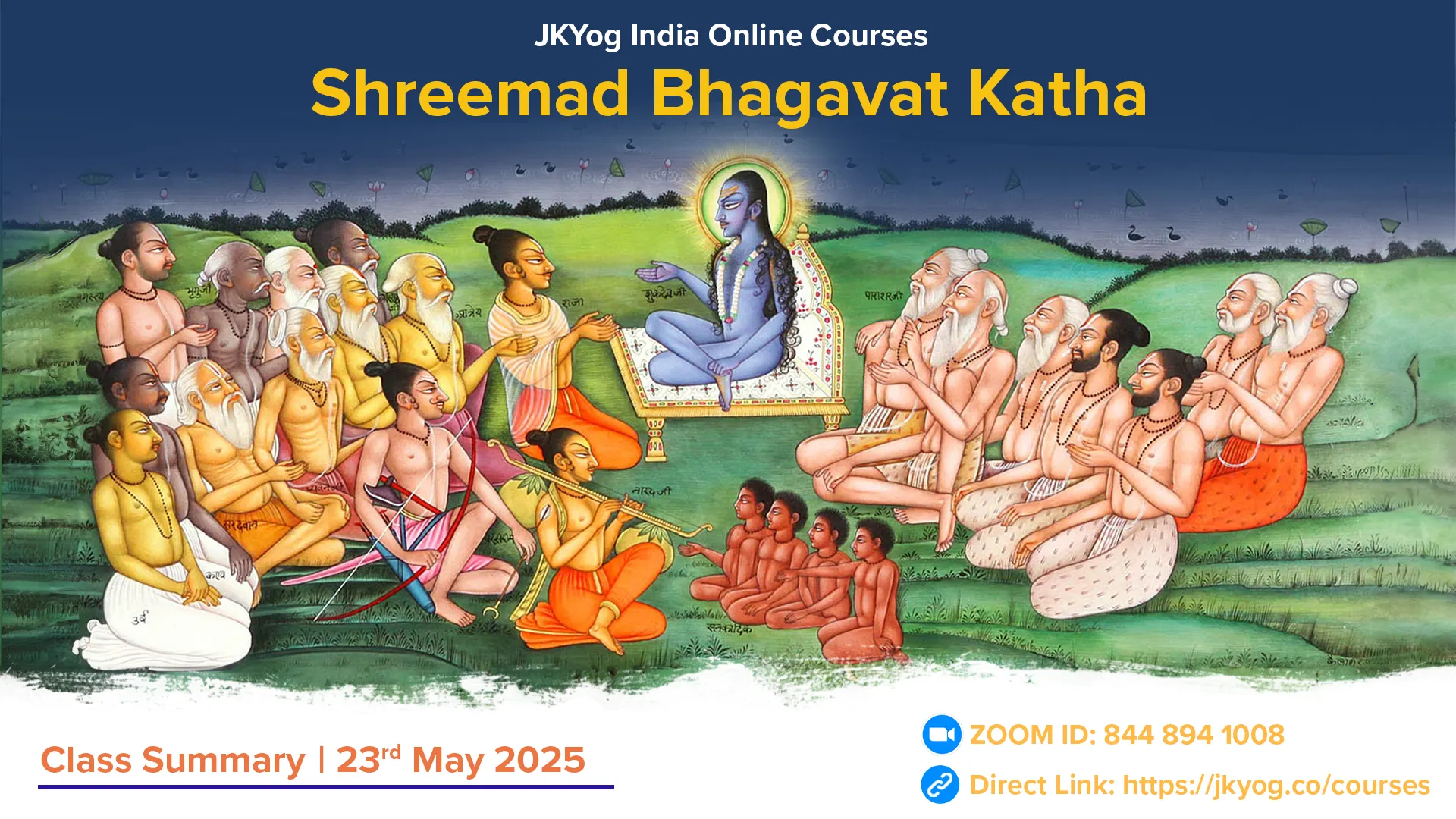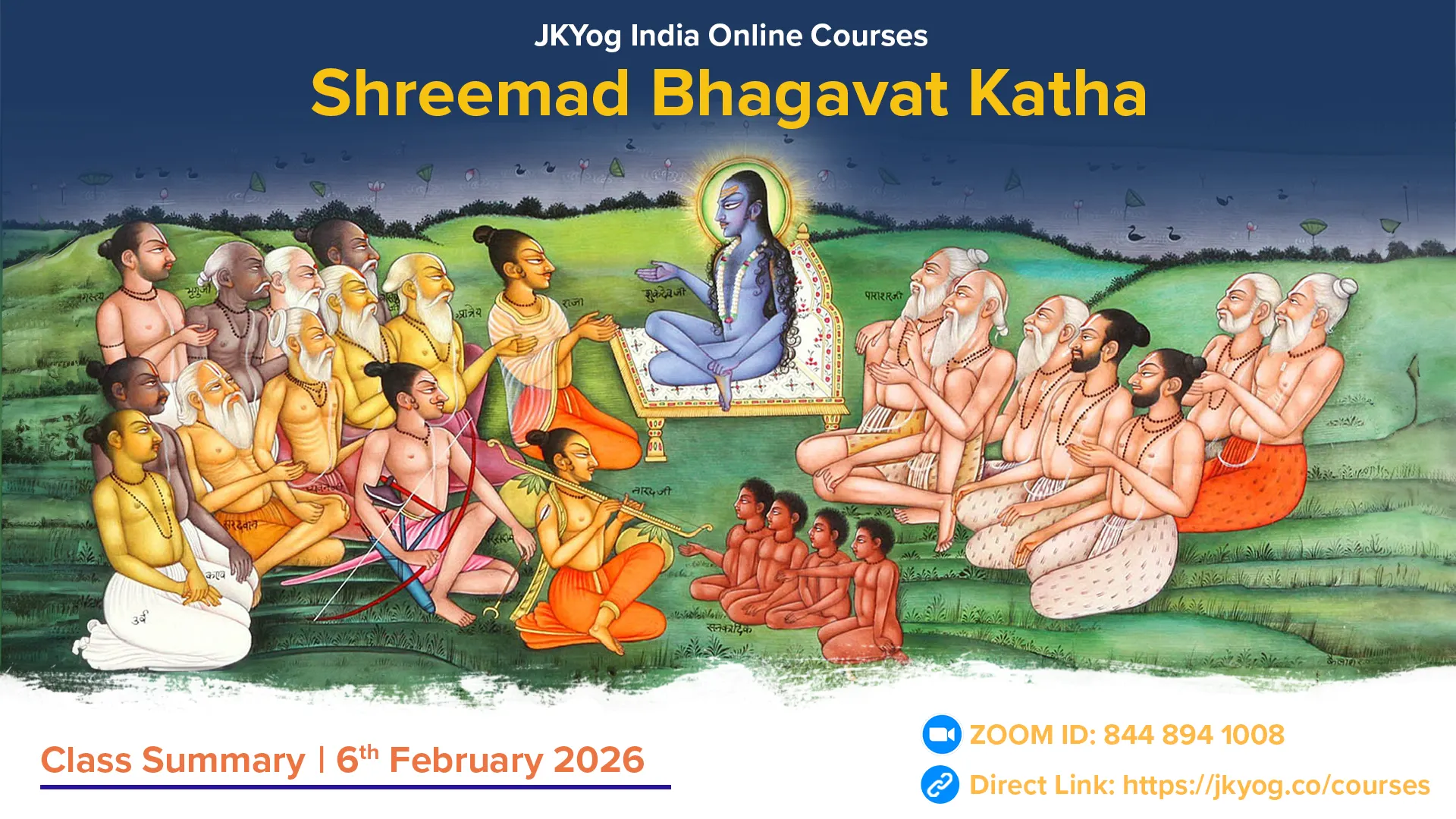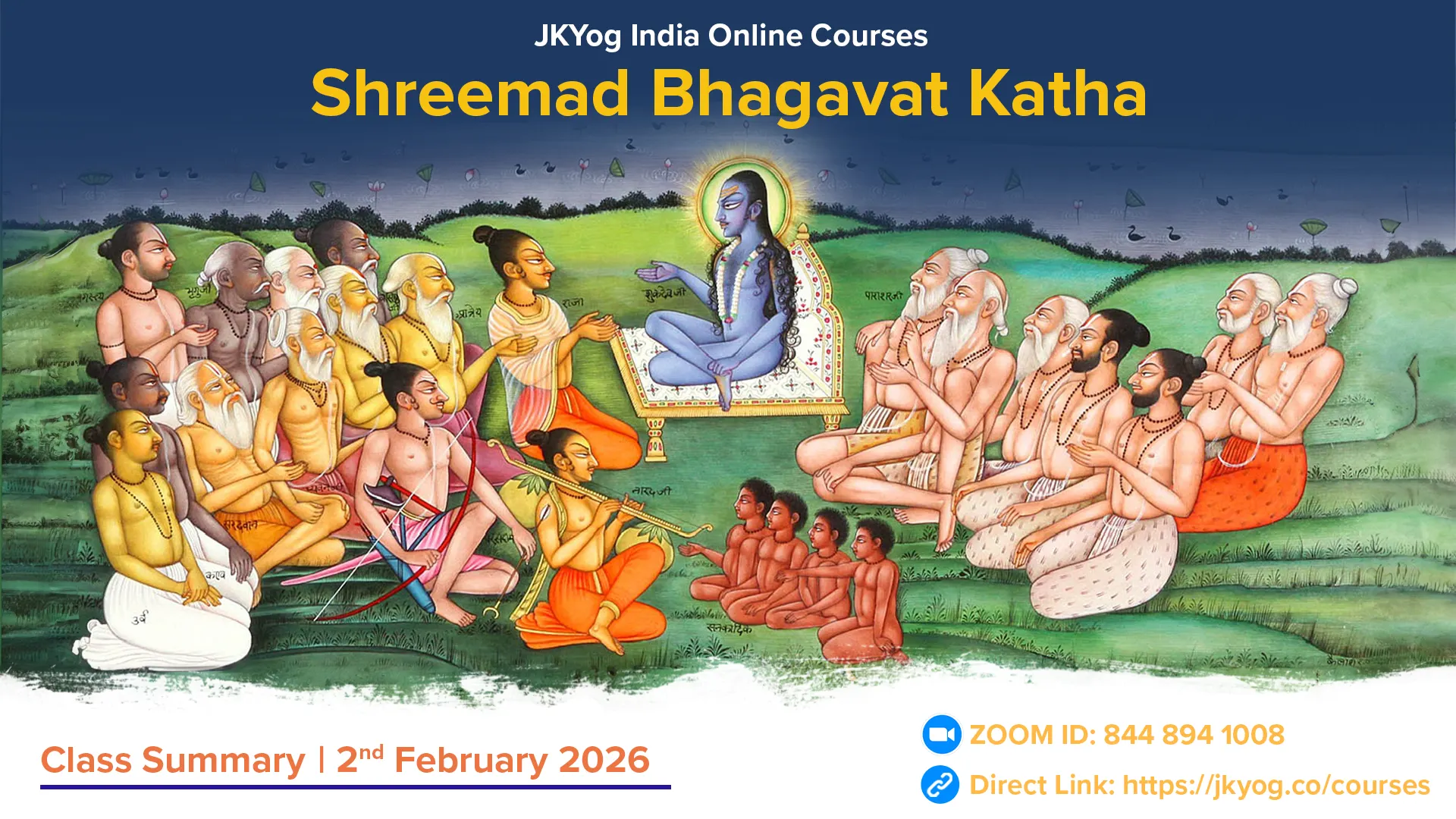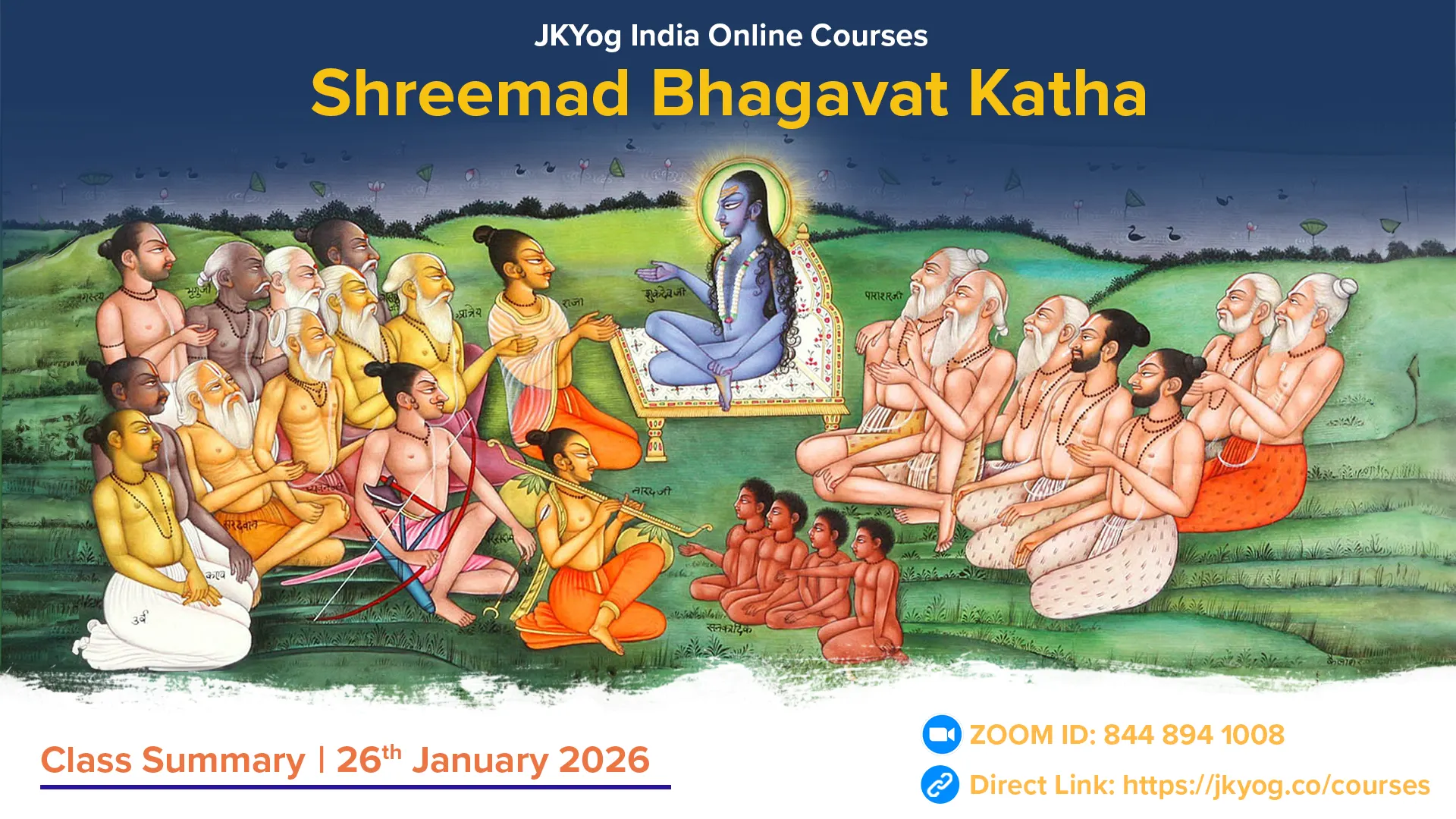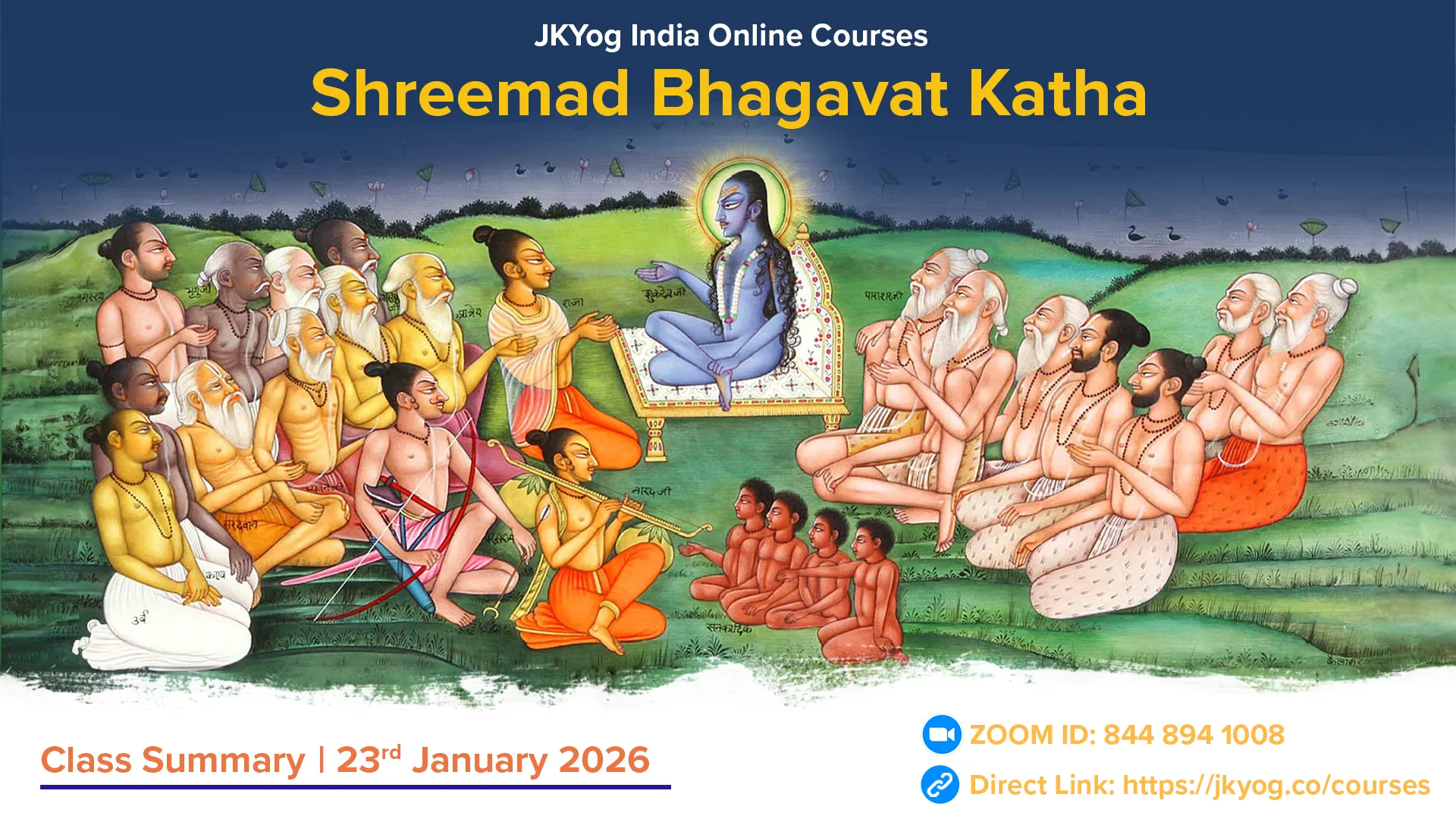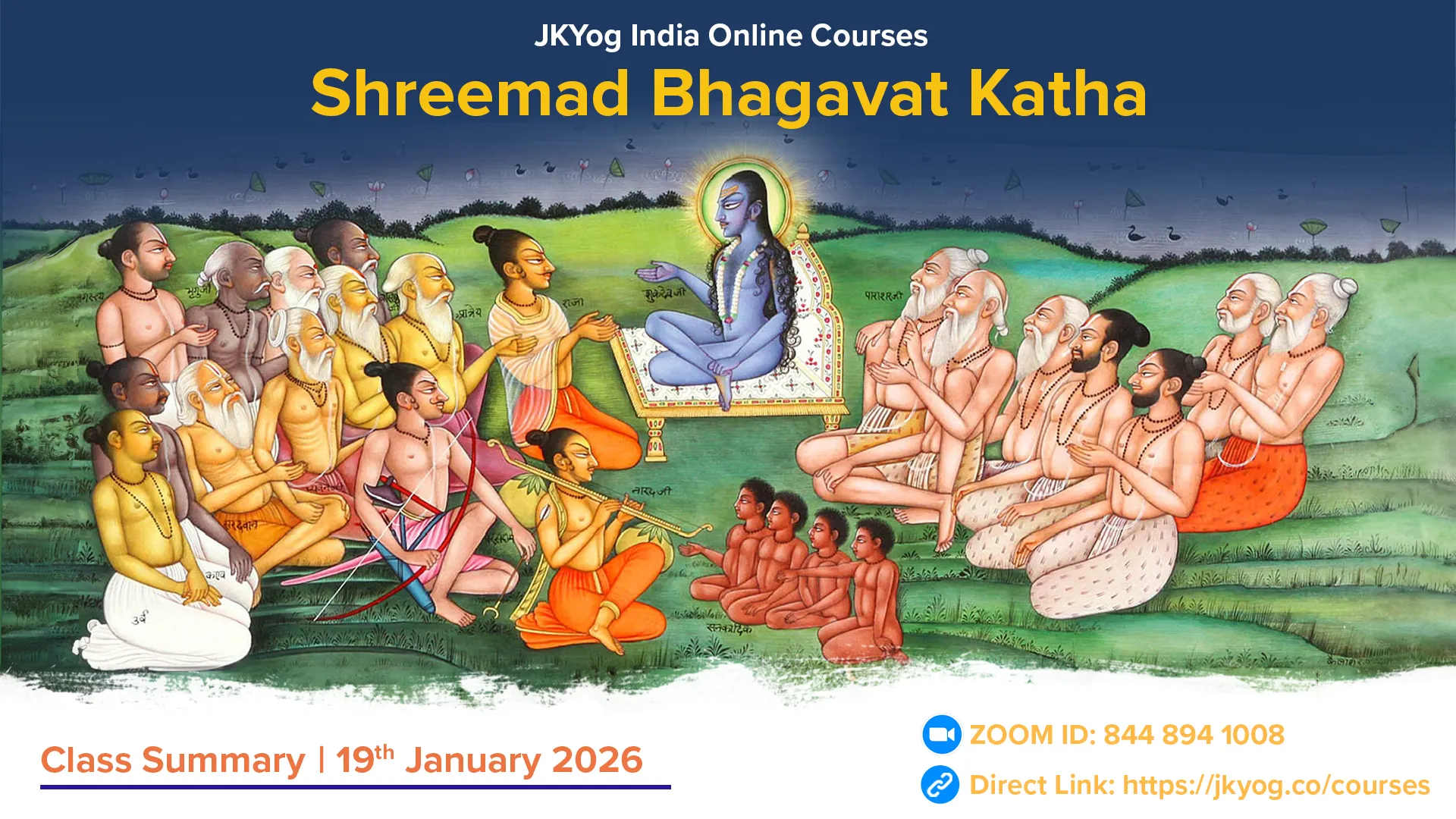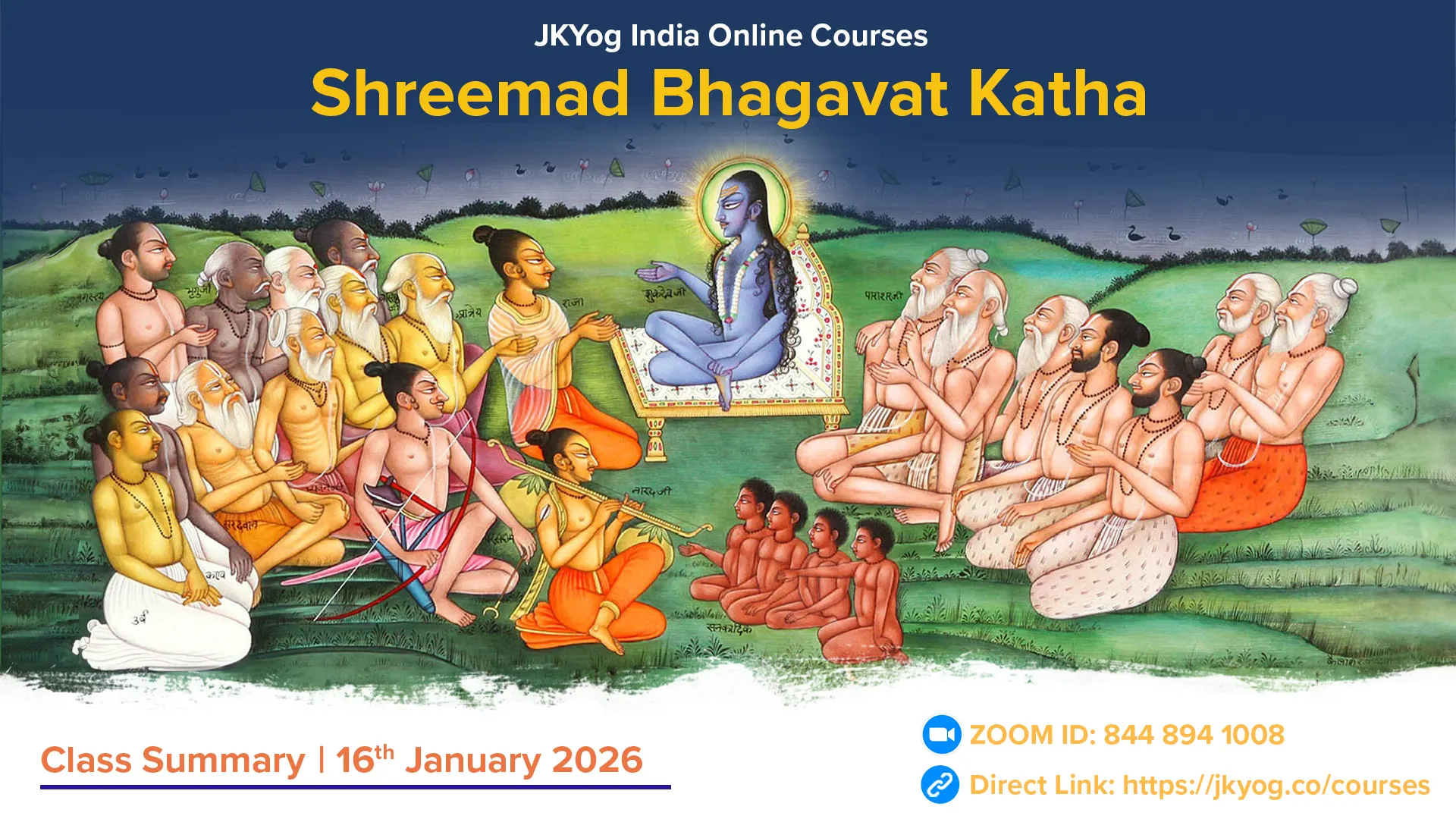Shreemad Bhagavat Mahapuran- Canto: 7, Chapters: 12-13
After explaining the concept of Varna, Naradji instructs Yudhishthir about the different stages of life (Ashrams). He begins with the rules of Brahmacharya Ashram (the celibate student stage). A brahmachari (celibate student) should control his senses, consider himself humble like a servant, and cultivate deep devotion at the feet of his Gurudev. He should assist his guru in his duties with an attitude of complete surrender. Every day, in the morning and evening, he should worship his guru, the fire god, the sun god, and other major devatas. In silence and with focused attention, he should perform Sandhya-vandan while chanting the Gayatri Mantra.
According to the scriptures, he should wear a mekhala (sacred belt), deerskin, appropriate clothing, jata (matted hair), a dand (staff), a kamandalu (water pot), a yajnopavita (sacred thread), and kusha grass. He must renounce oil, collyrium, body scrubs, images of women, meat, alcohol, flower garlands, perfumes, sandalwood paste, and ornaments. A brahmachari should go out for bhiksha (alms) in the morning and evening and offer it to the guru. He may eat only if the guru permits; otherwise, he should observe a fast.
He should protect his character, take moderate food, perform his duties efficiently, have shraddha (faith), and maintain control over his senses. He should interact with women only as much as necessary, as the senses are very powerful and can hinder one’s spiritual practice. Until self-realisation occurs, the duality of "I am a man, and she is a woman" remains, and the desire for enjoyment may arise. These rules benefit not only brahmacharis but also householders (grihasthi) and renunciates (sanyasi). For a householder, staying in a gurukul and serving the guru may be optional.
Thus, by living in a gurukul, a brahmin should study the Vedas, Vedangas, and Upanishads and acquire knowledge. Then, if he is capable, he should offer his guru the desired dakshina (offering) and, with his permission, enter into the grihastha, vanaprastha, or sanyas ashram, or he may choose to observe lifelong brahmacharya.
Now, Naradji explains to Yudhishthir the rules of Vanaprastha Ashram according to the views of the sages. By following these disciplines, a vanaprasthi (forest-dwelling hermit) easily attains the divine realms of sages such as Mahar Lok.
A vanaprasthi should not eat grains grown on ploughed land or those harvested out of season. He should avoid both fire-cooked and uncooked food. Instead, he must consume only roots, tubers, and fruits that have ripened naturally by the heat of the sun. He should perform regular and special havans using grains and herbs that grow naturally in the forest. He should discard previously stored food as soon as new fruits and flowers become available.
To protect the Agnihotra (sacred fire), he may take shelter in a thatched hut or a cave, but he must willingly endure natural conditions like heat, cold, and rain. He should let his jata grow and not cut his hair, nails, or body hair. He should also retain the dirt that accumulates on his body. He may carry a kamandalu, deerskin, staff, bark garments, and offerings for yajna. According to his capacity, a man should observe the rules of Vanaprastha Ashram for 12, 8, 4, 2, or at least 1 year. However, his austerities should not be so extreme that they lead to confusion or loss of intellect.
When the body becomes diseased or old age prevents even contemplation on Vedanta, he may choose to renounce life through fasting and other vows. Before undertaking anashan (voluntary fasting unto death), he should merge the sacred fires into his own self and renounce the notions of ‘I’ and ‘mine’, dissolving the body into its elemental origins.
He should gradually dissolve the senses and bodily elements into their source principles—prana into air, heat into fire, liquids into water, bones into earth, and cavities into ether. Ultimately, what remains is the pure conscious self (shuddha chaitanya atmam)—realising “That am I” (Soham)—he should become firmly established in advaita (non-duality). Just as fire becomes still and merges into its essence once the fuel is consumed, so too does the soul, settled in complete renunciation and samadhi, attain supreme peace.
Naradji says to Yudhishthir, "O Dharmaraj! If a vanaprasthi possesses the strength for contemplation on Brahman, then he should renounce everything except the body and enter into the Sanyas Ashram (the renounced order of life). A sanyasi should have no expectations from any person, object, place, or time. He should wander over the Earth with the rule of staying only one night in a village. If he wears clothing, it should be limited to a kaupin (loincloth). Unless there is some exceptional situation, he should not adopt any object other than the symbols of his ashram and the dand.
A sanyasi should be peaceful in mind, devoted to Bhagwan, well-wishing towards all beings, immersed in the bliss of the Self, and should wander alone without dependence on any worldly support. He should perceive Brahman in all of creation. Such a renunciate realises and knows that both bondage and liberation are products of Maya—neither of them is ultimately real.
A sanyasi should neither welcome death nor desire life. He should not take up any livelihood to sustain himself. He should not engage in scriptural debates merely for argument’s sake, nor take sides in any worldly ideology. He should not gather disciples, pursue extensive scriptural study, deliver discourses, or initiate grand spiritual events. Any external symbols of any ashram should not bind such a calm, equanimous, and noble sanyasi. It should make no difference to him whether he keeps or discards those symbols.
Though he may bear no external marks of sanyas, internally he should remain constantly immersed in self-inquiry (atma-anusandhan). He should be deeply thoughtful, yet appear to the world like a child, a madman, or a mute. Though wise and brilliant, he may seem ignorant to the common eye. Such a sanyasi is one who truly moves toward self-realisation.
To explain this further, Naradji narrates an ancient story to Yudhishthir—the dialogue between Rishi Dattatreya and the great devotee Prahlad.
Dattatreya’s Teachings to Prahlad on Contentment and Renunciation
Once, the great devotee Prahlad, the crown jewel among bhaktas, was travelling across various realms to understand what was going on in people's hearts. As he came to the foothills of the Sahyadri mountains, near the banks of the Kaveri River, he saw a man lying on the ground. He looked dusty and ordinary from the outside, but there was a quiet brilliance about Him. No one around could tell that this was an enlightened being. But Prahlad instantly recognised through His divine perception that this was none other than Bhagwan Dattatreya. Bowing with reverence, he touched His feet and asked humbly, “Bhagwan! You neither work nor enjoy worldly pleasures. Then how come Your body looks so healthy and full of vitality?”
Dattatreya smiled and replied:
“O Prahlad! You yourself know the fruits of actions and the liberation that comes from renouncing them. Because of your unwavering devotion, Bhagwan Narayan always resides in your heart. Still, moved by your love and respect, I will answer your question.
“O Prahlad! You yourself know the fruits of actions and the liberation that comes from renouncing them. Because of your unwavering devotion, Bhagwan Narayan always resides in your heart. Still, moved by your love and respect, I will answer your question.
Desire (trishna) is such a thing that it is never fulfilled, no matter how many pleasures a person receives. This very desire trapped me in the cycle of birth and death. I kept engaging in countless actions, which led me to take birth in countless life forms. In this birth, I attained an extremely rare human body. If one performs meritorious deeds, one may attain heaven; if one commits sins, one may fall into lower life forms; if one practises renunciation, one may attain liberation; and with mixed actions, one is reborn as a human again.
I observed that people go through immense effort to gain happiness and avoid sorrow, yet they only end up with more suffering. So I renounced all action. True happiness lies within the soul. When all movements of the mind cease, the Self reveals itself. Therefore, now I remain content with whatever comes as a result of prarabdha (destined karma). Forgetting their true inner joy, humans seek happiness in external pleasures. They abandon the Self and chase after sensory objects.
The body and its joys and sorrows are all subject to destiny. One who seeks lasting happiness through the body will not succeed. Even if someone gains wealth or comfort through great effort, peace still eludes them. The wealthy live in constant fear and suspicion. Those deeply attached to life and riches live in fear of everyone—kings, thieves, enemies, their own relatives, animals, beggars, time, and even their own selves. That is why a wise person should give up such attachments, which lead only to sorrow, delusion, fear, anger, and exhaustion.
I have two gurus—the honeybee and the python. The honeybee taught me that just as it collects honey through great effort only for someone else to take it away, similarly, hoarding wealth is futile. The python taught me to live effortlessly, remaining satisfied with whatever comes on its own—just like the python lies still and eats whatever is available.
Sometimes I eat little, sometimes a lot—sometimes tasty food, sometimes bland. Sometimes during the day, sometimes at night; sometimes once, sometimes twice. Sometimes I wear silk garments, sometimes bark and rags. Sometimes I sleep on the ground, sometimes on soft bedding. Sometimes I roam in palaces, and other times I wander like a naked madman. I neither criticise nor praise anyone. I only wish for all beings to attain union with the Supreme.
One who seeks the Truth should offer all the varied appearances of the world into the fire of inner contemplation. Let the mind be offered into the intellect, the intellect into the ego, the ego into mahat-tattva (the great principle), and finally, all of them into the Self, knowing them to be part of maya. Once this offering is complete, abide in the Self—silent, steady, and beyond all action.
O Prahlad! This inner account of mine is very secret, beyond even the scriptures. But because you are so dear to Narayan, I have shared it with you.”
Naradji narrates that when Prahlad heard this profound wisdom from Dattatreya, he worshipped Him with deep devotion. With a heart full of joy, he returned to his kingdom.
Summary: JKYog India Online Class- Shreemad Bhagavat Katha [Hindi]- 23.05.2025

